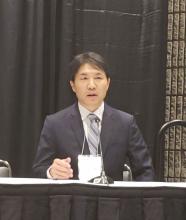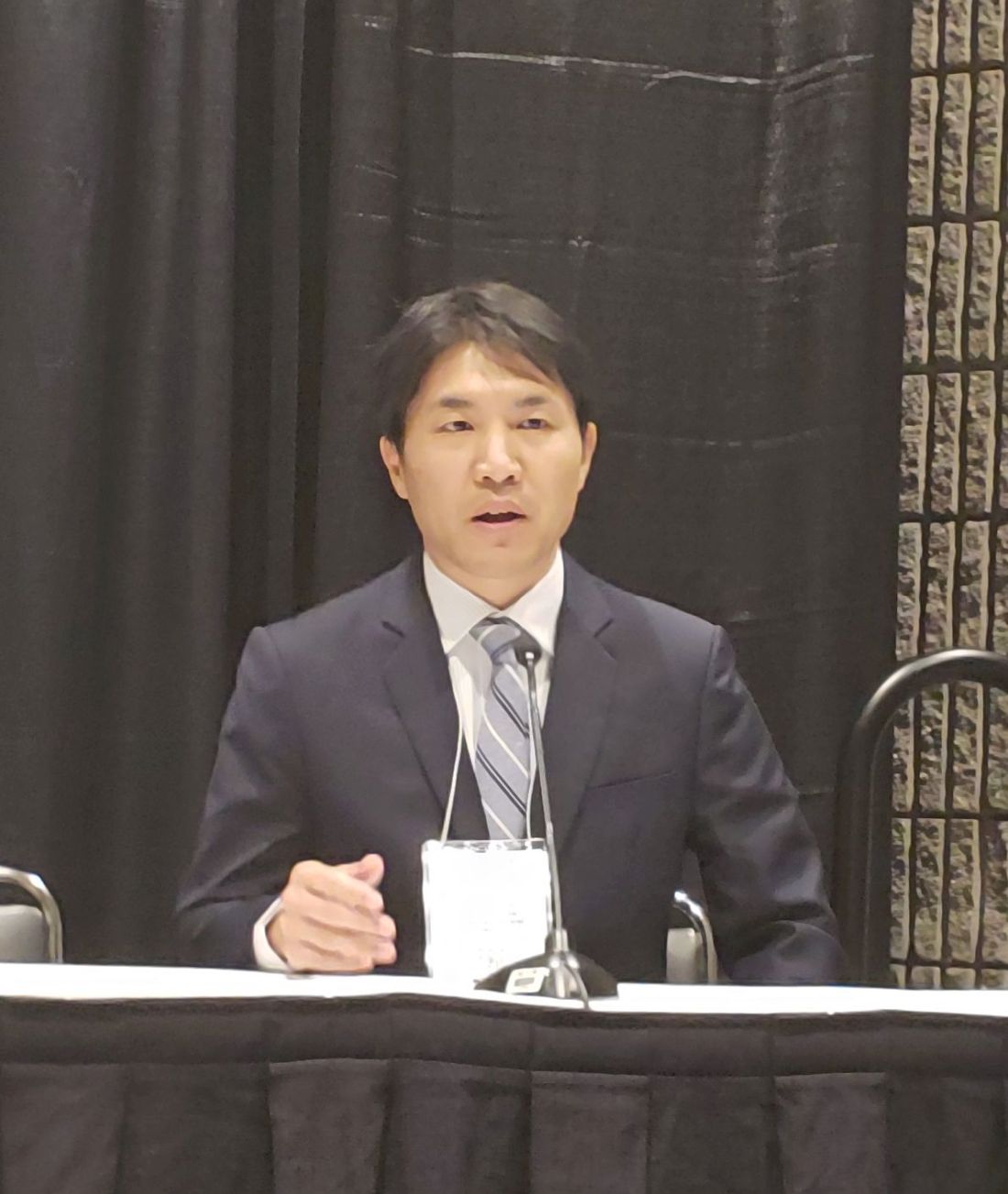User login
ATLANTA – Elderly-onset and young-onset rheumatoid arthritis patients initiating treatment with biologic disease-modifying antirheumatic drugs (bDMARDs) respond similarly with respect to clinical improvement at 48 weeks and adverse events, data from a large registry in Japan suggest.
The findings have important implications – particularly for elderly-onset rheumatoid arthritis (RA) patients, who tend to present with higher disease activity levels and increased disability, but who nevertheless receive biologics less frequently, compared with young-onset RA patients, according to Sadao Jinno, MD, of the department of rheumatology and clinical immunology, Kobe University Graduate School of Medicine, Osaka, Japan, and colleagues.
The findings were presented in a poster at the annual meeting of the American College of Rheumatology.
Of 7,183 participants in the multicenter observational registry, 989 who initiated bDMARDs and who had a DAS28-erythrocyte sedimentation rate score of at least 3.2 at the time of initiation were included in the current analysis. The proportion of elderly-onset RA patients in the registry was 36.8%, and the proportion of elderly-onset RA patients using bDMARDs was significantly lower than that among young-onset RA patients (18.3% vs. 28.0%; P less than .001), Dr. Jinno and colleagues reported.
However, after adjustment for differences in baseline characteristics between the two age groups, no significant difference was seen in Clinical Disease Activity Index (CDAI) score at 48 weeks (odds ratio, 1.01), Dr. Jinno said during a press conference highlighting the findings.
A trend toward lower remission rates was observed in the early-onset patients (OR, 0.52; P = 1.10). The low-disease activity/remission rate was similar in the groups after adjustment for multiple confounders (OR, 0.86; P = 0.77), he said, adding that drug maintenance rates and adverse event–related discontinuation rates also were similar in the groups (hazard ratio, 0.95; P = 0.78 for drug maintenance; HR, 0.78; P = 0.22 for discontinuation).
Patients were enrolled in the multicenter observational registry between September 2009 and December 2017, and those with onset at age 60 years or older were considered to have elderly-onset RA.
“In my daily practice, I see a lot of patients with elderly-onset RA who are treated with biologics very effectively and safely,” he said. “So we wanted to see if there really is any difference [in outcomes] between the elderly-onset patients and the young-onset patients.”
The findings suggest they can be treated as effectively and safely as younger patients, he said.
In a press release, he further stated that
Conversely, it is important to keep in mind that dysfunction in elderly-onset RA patients may worsen without timely biologic treatment, he noted.
Future investigation will focus on whether elderly-onset RA patients respond differently to “various modes of biologics,” he said.
Dr. Jinno and colleagues reported having no relevant disclosures.
SOURCE: Jinno S et al. Arthritis Rheumatol. 2019;71(suppl 10), Abstract 1345.
ATLANTA – Elderly-onset and young-onset rheumatoid arthritis patients initiating treatment with biologic disease-modifying antirheumatic drugs (bDMARDs) respond similarly with respect to clinical improvement at 48 weeks and adverse events, data from a large registry in Japan suggest.
The findings have important implications – particularly for elderly-onset rheumatoid arthritis (RA) patients, who tend to present with higher disease activity levels and increased disability, but who nevertheless receive biologics less frequently, compared with young-onset RA patients, according to Sadao Jinno, MD, of the department of rheumatology and clinical immunology, Kobe University Graduate School of Medicine, Osaka, Japan, and colleagues.
The findings were presented in a poster at the annual meeting of the American College of Rheumatology.
Of 7,183 participants in the multicenter observational registry, 989 who initiated bDMARDs and who had a DAS28-erythrocyte sedimentation rate score of at least 3.2 at the time of initiation were included in the current analysis. The proportion of elderly-onset RA patients in the registry was 36.8%, and the proportion of elderly-onset RA patients using bDMARDs was significantly lower than that among young-onset RA patients (18.3% vs. 28.0%; P less than .001), Dr. Jinno and colleagues reported.
However, after adjustment for differences in baseline characteristics between the two age groups, no significant difference was seen in Clinical Disease Activity Index (CDAI) score at 48 weeks (odds ratio, 1.01), Dr. Jinno said during a press conference highlighting the findings.
A trend toward lower remission rates was observed in the early-onset patients (OR, 0.52; P = 1.10). The low-disease activity/remission rate was similar in the groups after adjustment for multiple confounders (OR, 0.86; P = 0.77), he said, adding that drug maintenance rates and adverse event–related discontinuation rates also were similar in the groups (hazard ratio, 0.95; P = 0.78 for drug maintenance; HR, 0.78; P = 0.22 for discontinuation).
Patients were enrolled in the multicenter observational registry between September 2009 and December 2017, and those with onset at age 60 years or older were considered to have elderly-onset RA.
“In my daily practice, I see a lot of patients with elderly-onset RA who are treated with biologics very effectively and safely,” he said. “So we wanted to see if there really is any difference [in outcomes] between the elderly-onset patients and the young-onset patients.”
The findings suggest they can be treated as effectively and safely as younger patients, he said.
In a press release, he further stated that
Conversely, it is important to keep in mind that dysfunction in elderly-onset RA patients may worsen without timely biologic treatment, he noted.
Future investigation will focus on whether elderly-onset RA patients respond differently to “various modes of biologics,” he said.
Dr. Jinno and colleagues reported having no relevant disclosures.
SOURCE: Jinno S et al. Arthritis Rheumatol. 2019;71(suppl 10), Abstract 1345.
ATLANTA – Elderly-onset and young-onset rheumatoid arthritis patients initiating treatment with biologic disease-modifying antirheumatic drugs (bDMARDs) respond similarly with respect to clinical improvement at 48 weeks and adverse events, data from a large registry in Japan suggest.
The findings have important implications – particularly for elderly-onset rheumatoid arthritis (RA) patients, who tend to present with higher disease activity levels and increased disability, but who nevertheless receive biologics less frequently, compared with young-onset RA patients, according to Sadao Jinno, MD, of the department of rheumatology and clinical immunology, Kobe University Graduate School of Medicine, Osaka, Japan, and colleagues.
The findings were presented in a poster at the annual meeting of the American College of Rheumatology.
Of 7,183 participants in the multicenter observational registry, 989 who initiated bDMARDs and who had a DAS28-erythrocyte sedimentation rate score of at least 3.2 at the time of initiation were included in the current analysis. The proportion of elderly-onset RA patients in the registry was 36.8%, and the proportion of elderly-onset RA patients using bDMARDs was significantly lower than that among young-onset RA patients (18.3% vs. 28.0%; P less than .001), Dr. Jinno and colleagues reported.
However, after adjustment for differences in baseline characteristics between the two age groups, no significant difference was seen in Clinical Disease Activity Index (CDAI) score at 48 weeks (odds ratio, 1.01), Dr. Jinno said during a press conference highlighting the findings.
A trend toward lower remission rates was observed in the early-onset patients (OR, 0.52; P = 1.10). The low-disease activity/remission rate was similar in the groups after adjustment for multiple confounders (OR, 0.86; P = 0.77), he said, adding that drug maintenance rates and adverse event–related discontinuation rates also were similar in the groups (hazard ratio, 0.95; P = 0.78 for drug maintenance; HR, 0.78; P = 0.22 for discontinuation).
Patients were enrolled in the multicenter observational registry between September 2009 and December 2017, and those with onset at age 60 years or older were considered to have elderly-onset RA.
“In my daily practice, I see a lot of patients with elderly-onset RA who are treated with biologics very effectively and safely,” he said. “So we wanted to see if there really is any difference [in outcomes] between the elderly-onset patients and the young-onset patients.”
The findings suggest they can be treated as effectively and safely as younger patients, he said.
In a press release, he further stated that
Conversely, it is important to keep in mind that dysfunction in elderly-onset RA patients may worsen without timely biologic treatment, he noted.
Future investigation will focus on whether elderly-onset RA patients respond differently to “various modes of biologics,” he said.
Dr. Jinno and colleagues reported having no relevant disclosures.
SOURCE: Jinno S et al. Arthritis Rheumatol. 2019;71(suppl 10), Abstract 1345.
REPORTING FROM ACR 2019

